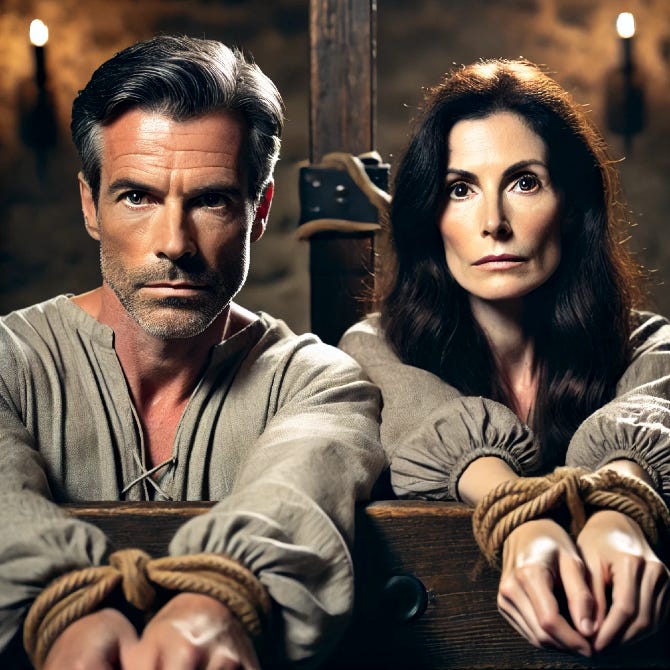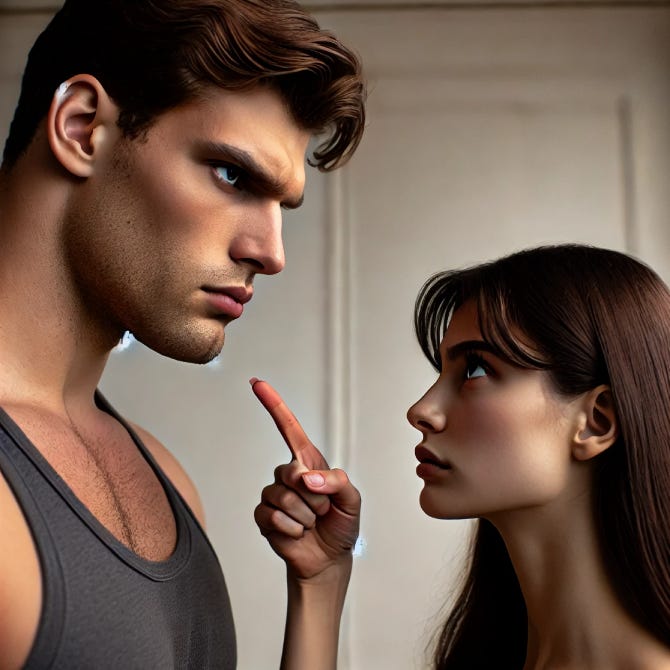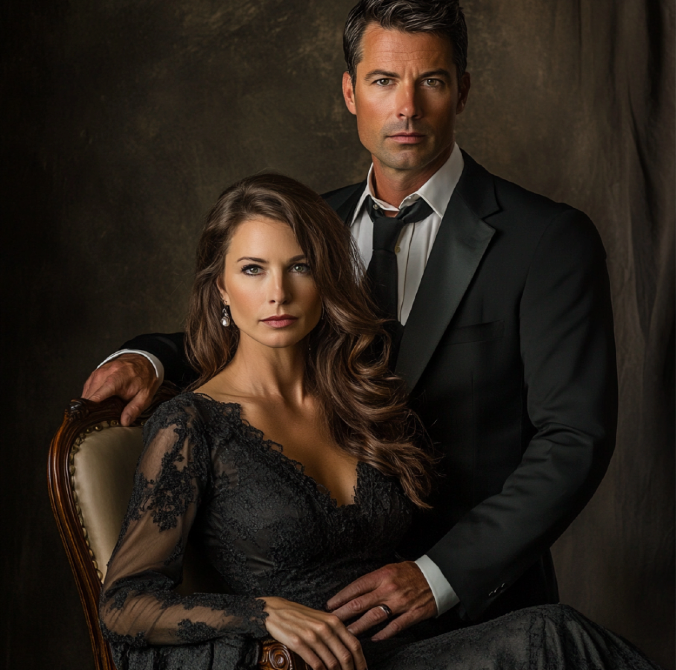The Mistaken Beliefs that Ruined My Marriage: Lessons from the Wreckage
When Marriage Fails: A Journey Through Divorce and Self-Discovery (Part 3 of 5)
Part 1
Part 2
I’m blessed that I’ve always had genuine self-confidence, not complete, not unshakable, but durable enough to feel prideful certainty in areas where ignorance reigned.
I built up mistaken beliefs that undermined my marriage. They took root quietly, twisting my actions, warping my perspective, making me forget the core of who I was.
I acted in ways that stripped me of my strength and eroded the confidence I’d once wielded like a warrior.
This wasn’t the man I knew myself to be.
I lost him in compromise after compromise, not the kind, accommodating acquiescence that limits relationship turbulence. I postured, then submitted weakly, femininely, to her masculine power, preferring to avoid the battlefield and the emotional damage.
If I fought her masculine with my own, the mutual wounding would scar us both, hastening divorce to dodge the draft and avoid combat.
Caving to demands seemed the only option, but the coward’s death is just as certain, merely dragged out like a torturer’s rack, the agony prolonged, perhaps twenty years or more.
Each misstep weakened what should have been unshakable, and I watched it crumble, helpless to hold the pieces together, unable to comprehend what I now believe.
Looking out at the road rushing under my wheels
I don't know how to tell you all just how crazy this life feels
Look around for the friends that I used to turn to to pull me through
Looking into their eyes, I see them running tooRunning on (running on empty)
Running on (running blind)
Running on (running into the sun)
But I'm running behindRunning on Empty—Jackson Browne
But from the wreckage, I learned.
My motivation was honorable, yet my marriage failed, so I reviewed what I did and why.
It wasn’t my intentions; my failure was how my good intentions were distorted, warped like a carnival mirror, pointing to the wrong behavior, producing results contrary to my desires, the death of my marriage.
My research, my look inside, revealed truths about love, respect, and boundaries I should have known better than to cross or ignore.
I changed inside based on what I learned.
I also learned there are subtle reactions in myself, or a lover, I couldn’t accept—tiny, almost invisible cracks in behavior, subtle attitudes that, over time, could hollow out a person’s heart.
Divorce was a hard lesson, sharp and unforgiving, but it opened my eyes. I walked away, knowing myself in a way I hadn’t before, knowing what I needed and could no longer overlook.
Women’s Liberation and Equality
I believe women stand as equals to men—in intellect, in society, in politics, and in economics. There is no task of the mind or heart that men can do and women cannot. Women and men are made of the same grit and fire, equally capable of pushing boundaries and crossing lines others say they shouldn’t. They deserve equal rights, equal pay, and equal footing, plain and simple.
Misogyny—the last crutch of weak men—is how the fearful and the small-hearted try to keep women down. They wield it like a blunt weapon, holding back talent and ambition to serve their own purposes, always at a woman’s cost.
When the women’s liberation movement stands up against misogyny, I stand with them. For too long, men like these have wielded their ignorance as power, and it has to end. Misogyny has nothing to do with true masculinity. Dominance isn’t keeping others trapped, dependent, lording over them like a petty tyrant, Handmaiden’s Tale style.
True strength and dominance are signs that a man has tamed and forged himself, embodying passion, boundless energy, the straight arrow that never wavers.
But I’ve also seen the complexity of this struggle. The women’s liberation movement fights a worthy fight, but even noble change can be sharp-edged. What might elevate one part of life sometimes makes another part heavier.
No Household Equality
Men and women as couples do not stand as equals, not in private.
Despite society conspiring to shape us, fundamental power dynamics, coded into our DNA for what attracts and repels, resist society’s wishes and demands.
We are shaped differently, each with a role that fits into the other. Men embody masculinity—dominant, assertive, and unafraid. We are meant to lead with courage and strength at our core. Women balance this, holding the grace of femininity: nurturing, supportive, sensitive, and steady as companions. Together, we form a natural rhythm, one supporting the other, each filling spaces the other cannot.
Relationships were never meant to be constant battles for control, a relentless struggle of wills. When both carry the weight of dominance, even the slightest disagreement can grow, becoming a power play where each tries to rule over decisions that should unite rather than divide.
Put up your dukes, let's get down to it
Hit me with your best shot
Why don't you hit me with your best shot
Hit me with your best shot
Fire awayHit me with your best shot—Pat Benatar
Battles and endless disagreements create negative energy—a wedge that grows until it drives people apart. And when the one who bends or loses holds onto resentment, it becomes a slow drain, sapping the bond until it withers.
In the end, strength lies not in battling each other but in balancing each other, moving in step, and learning where to lead and where to follow.
Couples functioning as democracies of two fail to function, too many disputes become intractable impasses that reduce momentum, festering as anger never to be resolved. A decisive, trustworthy leader decides for the couple, consequences are shared, forgiveness granted, the relationship progresses.
The Masculine Woman
When a woman turns masculine, a man with true masculinity won’t be drawn to her, and not because men fail to admire a strong woman.
Men with strength admire and respect a woman who stands tall, willing to face adversity.
However, masculine men want to fight for their mates, not with their mates.
There’s a thrill for men in winning a woman’s heart but none in battling her for control.
If a woman chooses to clash for power rather than offer support, a strong man will state his views, acknowledging the woman’s truth, but he wastes little effort convincing or arguing—he disengages the conflict, walks away, never escalates.
If they fail to find common ground on important issues, rather than battle to impose change on each other, a gentleman will politely move on, never clinging, cajoling, or surrendering his power.
A feminine woman considering nesting with a masculine man accepts his character, his behavior as-is, knowing up-front she can’t bend him to her will. A gentleman’s nest is not a guilded cage confining the dove. Flying or nesting is entirely up to her.
Couples are meant to share warmth, to build something steady and sound together, not to be dragged down by constant skirmishes. Good energy, easy and unforced, should flow between them.
Masculine women will always struggle to maintain a relationship with a truly masculine man due to the conflicts and struggle for power.
The Beta Male
Masculine women end up with weak men, men who yield to a dominant woman’s strength. It keeps the peace, at least for a while.
Beta men share a single trait: they’ll sacrifice anything to keep a woman around, to please her, to avoid rocking the boat.
A dominant woman finds fleeting satisfaction in this, a thrill in having a man bend to her will, a rush of power that lingers for a time.
But in the long run, she feels something slipping. Even the strongest woman feels the pull to want a stronger man who can tame her wild edges. It’s in our biology.
She may conquer, control, and cycle through weaker men, but once she has a man fully under her thumb, her attraction for him flags, her fire goes out, and the rush of power loses wattage.
She starts looking outward, feeling the urge to leave and search for someone new, someone stronger, a masculine man.
I'm a loser baby, so why don't you kill me?
Loser—Beck
Disney's Aladdin is Pathetic
Disney's Aladdin wasn’t a man of strength. He was a scoundrel trying to charm his way into life with a princess—a life where she held all the power.
The writers dressed him up with just enough of an edge to be mysterious, gave him a makeshift home, and crafted situations where he could swoop in, play hero, and show his devotion.
For a time, it worked. He seemed bold enough, edgy enough, almost worthy of the princess he sought.
But when she took her power back, standing tall with her own authority, exuding masculine power, he looked small beside her, a shadow of masculinity, submissive, softened, foolish.
It didn’t matter how he got there or the lengths he went to impress her. Once in her world, he looked like a man without courage, a figure too meek to claim a king’s castle.
His appeal dropped to nothing.
All the edge vanished, leaving only a flaccid shell of a man too limp to rise to the throne, a cute loser for the cover of Tiger Beat Magazine, a pre-teen crush, not a man.
Hawks and Doves
Men are hawks, built to face conflict, to risk everything for what they need. Women are doves, drawn to peace, valuing cooperation and harmony over the threat of battle. When two hawks clash, they fight until one is beaten, both left battered and scarred.
When two doves meet, they can befriend each other, but their gentle natures leave them exposed and vulnerable to any stronger force, any passing hawk.
When a hawk meets a dove, the hawk can easily overpower and control without mercy. But when a man and woman come together, the man—the hawk—protects the dove, shielding her from all masculine threats, including his own, defending what they’ve built together. This isn’t weakness or control exhibited by men who lack strength and need dominance to feel secure. This is nature, a balance of power and gentleness, each holding their own place.
I once believed that men and women should be equal in all things and that setting aside traditional roles would forge a stronger bond between husband and wife. This misguided belief led me down a path of mistakes in my marriage, blind to the balance of power that kept it alive.
I clung to values that pushed her away and ignored the things that drew her close.
In trying to be equal, I lost what made us whole.
What Women Want
Popular culture spreads endless falsehoods about what women want, feeding us stories that miss the truth. Women complain about masculine traits, about men being hard-hearted, overbearing, and sexually insatiable. They say they despise men who play games, act arrogantly, stride in, take what they want.
Yet, time and again, they’re drawn to those very men, the ones who stand assertively, courageously, the winners.
We are the champions
No time for losers
'Cause we are the champions of the WorldWe Are The Champions—Queen
Women claim to want softness, sensitivity, and submission. But when men provide it in abundance, it only turns women away.
A man who’s too soft, too afraid to stand his ground, loses a woman’s interest.
Women want a touch of sensitivity, but too much it looks like weakness, which it often is, ass-kissy behavior that’s nauseatingly pathetic.
Women don’t view friends as potential lovers; they feel no spark for men populating the friend zone. Many men waste time playing the friend, hoping for a spark that will never ignite.
Two simple truths that people resist: women are drawn to strength, even in the forms they profess to hate, and a woman must submit to the masculine to be entirely feminine.
Popular culture tells us women want equality in the bedroom, that they want a fair and balanced play of power.
But it’s a lie.
Women want to be dominated, but only by a man they see as strong, a true alpha. They submit willingly to power, confidence, and control—not to arrogance or cruelty, but to a steady hand that knows what it wants.
Young, beautiful women are drawn to men who wield status, wisdom, and wealth; they’ll surrender themselves to older men of power if it means feeling that raw, commanding presence.
Men like Leonardo DiCaprio never struggle to find women willing to spit-polish his knob, eager just for the chance to please him.
When a masculine woman refuses to embrace the feminine, an alpha male will turn away—or turn elsewhere.
When Bill Clinton was president, he was the most powerful man on earth, as alpha as it gets. When asked why he had Monica Lewinski blow him, he answered, “Just because I could.” He failed to add clarifying words to conceal the lurid truth, “Just because I could, with her. Hillary wouldn’t.”
Women work hard to distinguish genuine strength from bravado. They filter, testing for genuine alphas and pushing aside men who only pretend.
Coward’s Death of Beta Male
When women can’t find what they want, women settle for betas, the men who bend, who strive for equality and balance, men who believe acting a woman’s toady turns her on.
This struggle poisons them both.
The beta male suffers, stripped of his masculinity one shred at a time, assuming he ever had any.
The woman suffers, too, feeling unsatisfied and frustrated, clawing for control until the relationship is in tatters, an unrecognizable rag.
I once foolishly believed that we could ignore traditional roles, that a new, egalitarian coupling relationship, a panacea; our evolving society had discovered a better way to love.
Power-sharing couples, as a concept, sounds hip, strong, and impressive, perhaps even idealistic and utopian, but it fails in practice for power dynamics explained by hawks and doves, and in the laboratory of real life.
Carrying a host of related misguided beliefs, I became a beta, discarding my masculinity out of ignorance, surrendering my power without a fight.
Now please don't think I'm weak, I didn't turn the other cheek
And Papa, I should hope you understand
Sometimes you gotta fight when you're a manCoward of the County—Kenny Rogers
I yielded who I was, softening myself to fit an idea. In doing so, I abandoned her needs, lost sight of her desire for strength and direction, and failed her.
Abandoning traditional roles, embracing the perpetual conflict for power between two masculine forces is an emotionally draining loser’s game nearly as futile as tic-tac-toe.
We must understand that the power dynamics of the hawk and dove are coded into our DNA, impervious to changing social norms, residing at the root of attraction, a framework for building a wealth of love and goodwill. When we knowingly embrace our roles rather than resisting them, we find the love and relationship harmony we long for.
















